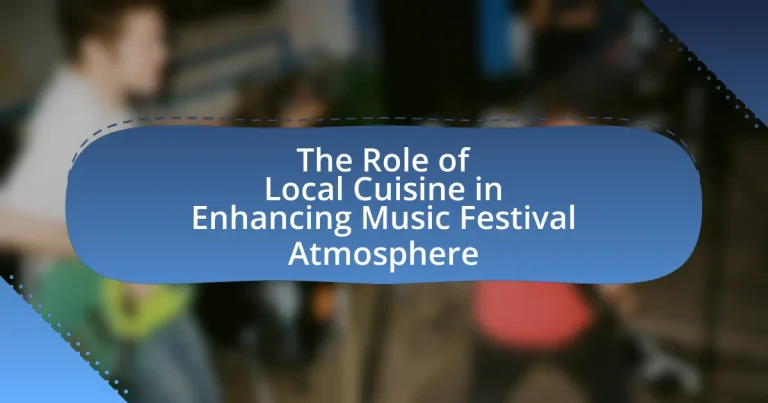Local cuisine plays a vital role in enhancing the atmosphere of music festivals by providing a cultural experience that complements musical performances. The integration of regional dishes fosters community engagement and supports local economies, as studies show that food options significantly influence festival enjoyment. Sensory elements such as aroma, taste, and visual presentation contribute to a memorable experience, while the representation of local culinary traditions reflects the identity of the festival’s location. Additionally, incorporating local cuisine can boost attendance and revenue, making it essential for festival organizers to effectively integrate these culinary elements into their planning.

What is the role of local cuisine in enhancing music festival atmosphere?
Local cuisine plays a crucial role in enhancing the atmosphere of music festivals by providing a unique cultural experience that complements the musical performances. The integration of local food allows festival-goers to engage with the region’s culinary traditions, fostering a sense of community and belonging. For instance, festivals that feature regional dishes often attract attendees who are eager to explore local flavors, which can lead to increased attendance and satisfaction. Research indicates that food experiences can significantly influence overall event enjoyment, with studies showing that 70% of festival attendees consider food options as a key factor in their festival experience. This connection between local cuisine and the festival atmosphere not only enriches the sensory experience but also supports local economies by promoting local vendors and artisans.
How does local cuisine contribute to the overall experience of music festivals?
Local cuisine significantly enhances the overall experience of music festivals by providing attendees with a unique cultural immersion that complements the musical performances. The integration of regional dishes allows festival-goers to engage with the local culture, fostering a sense of community and connection to the area. For instance, festivals often feature food vendors that showcase traditional recipes and ingredients, which not only satisfy hunger but also educate attendees about the culinary heritage of the region. This culinary aspect can elevate the festival atmosphere, making it more memorable and enriching. Studies have shown that food experiences can influence emotional responses and satisfaction levels at events, indicating that local cuisine plays a crucial role in enhancing the overall enjoyment of music festivals.
What sensory elements of local cuisine enhance the festival atmosphere?
The sensory elements of local cuisine that enhance the festival atmosphere include aroma, taste, and visual presentation. The aroma of traditional dishes wafting through the air creates an inviting environment, stimulating appetite and evoking cultural memories. Taste plays a crucial role, as unique flavors from local ingredients provide attendees with an authentic experience that connects them to the region’s heritage. Additionally, the visual presentation of colorful dishes and vibrant food stalls contributes to the overall festive ambiance, making the event more engaging and enjoyable. These sensory elements collectively foster a sense of community and celebration, integral to the festival experience.
How does the presentation of local dishes impact festival-goers’ enjoyment?
The presentation of local dishes significantly enhances festival-goers’ enjoyment by creating a visually appealing and culturally immersive experience. When local cuisine is presented attractively, it not only stimulates appetite but also fosters a connection to the region’s culture, making the dining experience more memorable. Research indicates that visually appealing food can increase perceived taste and satisfaction; for instance, a study published in the journal “Appetite” found that food presentation influences diners’ enjoyment and willingness to pay more for aesthetically pleasing dishes. Thus, the way local dishes are presented at festivals plays a crucial role in elevating the overall enjoyment of attendees.
Why is local cuisine important for cultural representation at music festivals?
Local cuisine is important for cultural representation at music festivals because it serves as a tangible expression of the region’s identity and heritage. By offering local dishes, festivals create an immersive experience that connects attendees to the cultural context of the music being performed. This connection is reinforced by the fact that food traditions often reflect historical influences, agricultural practices, and community values unique to the area. For instance, festivals in New Orleans prominently feature Cajun and Creole cuisine, which highlights the city’s diverse cultural influences and enhances the overall atmosphere, making the event more authentic and engaging for participants.
How does local cuisine reflect the identity of the festival’s location?
Local cuisine reflects the identity of a festival’s location by showcasing regional ingredients, traditional cooking methods, and cultural heritage. For instance, a music festival in New Orleans prominently features Cajun and Creole dishes, which are integral to the city’s cultural identity, influenced by French, Spanish, and African culinary traditions. This connection is evident in the use of local seafood, spices, and cooking techniques that define the area’s gastronomy. Additionally, festivals often highlight local food vendors, reinforcing community ties and promoting local economies, which further emphasizes the unique identity of the location.
What role does local cuisine play in promoting regional culture and traditions?
Local cuisine plays a crucial role in promoting regional culture and traditions by serving as a tangible expression of a community’s identity and heritage. It reflects the history, agricultural practices, and cultural influences unique to a region, thereby fostering a sense of belonging among residents and attracting visitors. For instance, traditional dishes often incorporate locally sourced ingredients, which not only supports local economies but also preserves culinary practices passed down through generations. Festivals that celebrate local cuisine, such as food fairs or culinary competitions, further enhance cultural awareness and appreciation, showcasing the diversity and richness of regional traditions. This connection between food and culture is evident in studies that highlight how culinary experiences can deepen cultural understanding and engagement during events like music festivals, where local dishes complement the overall atmosphere and create a more immersive experience for attendees.
What are the economic benefits of incorporating local cuisine into music festivals?
Incorporating local cuisine into music festivals generates significant economic benefits by attracting more attendees and increasing overall spending. Festivals that feature local food options often see higher visitor numbers, as attendees are drawn to unique culinary experiences that reflect the region’s culture. For instance, a study by the National Endowment for the Arts found that festivals with local food offerings can increase attendance by up to 30%, leading to greater ticket sales and vendor revenues. Additionally, local food vendors benefit from increased sales, which can boost the local economy by keeping money within the community. This symbiotic relationship enhances the festival’s appeal while simultaneously supporting local businesses, creating a sustainable economic model.
How does local cuisine support local businesses during festivals?
Local cuisine supports local businesses during festivals by attracting attendees who seek authentic culinary experiences. Festivals often feature food stalls and vendors that showcase regional dishes, which not only enhance the festival atmosphere but also drive foot traffic to local establishments. For instance, a study by the National Endowment for the Arts found that food-related activities at festivals can increase local economic activity by up to 30%. This influx of visitors leads to higher sales for local restaurants, food producers, and artisans, thereby reinforcing the economic viability of the community.
What impact does local cuisine have on festival revenue and attendance?
Local cuisine significantly enhances festival revenue and attendance by attracting visitors who seek authentic culinary experiences. Festivals that feature local food vendors often see increased foot traffic, as attendees are drawn not only to the music but also to the unique flavors of the region. For instance, a study by the National Endowment for the Arts found that festivals incorporating local cuisine can boost attendance by up to 30%, as food becomes a central part of the festival experience. Additionally, local food offerings can increase spending per attendee, with reports indicating that food and beverage sales can account for over 50% of total festival revenue. This correlation between local cuisine and festival success underscores the importance of culinary elements in driving both attendance and financial performance.
How can local cuisine be effectively integrated into music festival planning?
Local cuisine can be effectively integrated into music festival planning by incorporating food vendors that specialize in regional dishes, creating a culinary experience that complements the festival’s cultural theme. This approach not only supports local businesses but also enhances the overall atmosphere by providing attendees with authentic flavors that reflect the area’s heritage. For instance, festivals like the New Orleans Jazz & Heritage Festival showcase local Creole and Cajun dishes, attracting food enthusiasts and enriching the cultural experience. Additionally, offering cooking demonstrations or food workshops can engage attendees further, fostering a deeper connection to the local culinary traditions.
What challenges do organizers face when including local cuisine at festivals?
Organizers face several challenges when including local cuisine at festivals, primarily related to logistics, food safety, and cultural representation. Logistics can be complex due to the need for adequate space, equipment, and staffing to prepare and serve food, which can strain resources. Food safety regulations must be strictly adhered to, as local dishes may involve unique ingredients or preparation methods that require specific handling to prevent health risks. Additionally, ensuring that the local cuisine authentically represents the culture while appealing to a diverse audience can be difficult, as organizers must balance traditional recipes with the preferences of festival-goers. These challenges highlight the intricacies involved in successfully integrating local cuisine into festival experiences.
How can organizers overcome logistical issues related to local food vendors?
Organizers can overcome logistical issues related to local food vendors by implementing a structured planning process that includes clear communication, designated spaces, and efficient scheduling. Establishing a detailed layout for vendor placements ensures that food stalls are easily accessible to attendees while minimizing congestion. Additionally, providing vendors with a timeline for setup and breakdown helps streamline operations, as evidenced by successful festivals that have utilized this approach, resulting in reduced wait times and improved vendor satisfaction. Furthermore, organizers can facilitate collaboration among vendors to share resources, such as equipment and staff, which can enhance efficiency and reduce costs.
What strategies can be employed to ensure food safety and quality at festivals?
To ensure food safety and quality at festivals, implementing strict food handling protocols is essential. These protocols include training food vendors on hygiene practices, ensuring proper food storage temperatures, and conducting regular inspections of food stalls. For instance, the U.S. Food and Drug Administration (FDA) recommends that food vendors maintain hot foods at 140°F or above and cold foods at 40°F or below to prevent foodborne illnesses. Additionally, utilizing local ingredients can enhance food quality while supporting local economies, as fresh produce is often safer and more flavorful. By adhering to these strategies, festivals can significantly reduce the risk of food safety issues and enhance the overall experience for attendees.
What are some successful examples of local cuisine enhancing music festivals?
Successful examples of local cuisine enhancing music festivals include the New Orleans Jazz & Heritage Festival, which showcases local Creole and Cajun dishes alongside performances by renowned musicians, attracting over 400,000 attendees annually. Another example is the Austin City Limits Music Festival, where Texas barbecue and Tex-Mex cuisine are featured, contributing to the festival’s appeal and drawing in large crowds. Additionally, the Taste of Chicago festival combines live music with local culinary offerings, celebrating the city’s diverse food scene while hosting over 1.5 million visitors each year. These festivals demonstrate how integrating local cuisine can significantly enhance the overall experience and atmosphere for attendees.
Which festivals are known for their exceptional local food offerings?
Festivals known for their exceptional local food offerings include the New Orleans Jazz & Heritage Festival, which showcases Creole and Cajun cuisine, and the Taste of Chicago, featuring diverse dishes from local restaurants. The San Francisco Street Food Festival highlights the city’s vibrant food truck culture, while the Portland Feast celebrates local ingredients and chefs. These festivals not only provide unique culinary experiences but also enhance the overall atmosphere by connecting attendees with regional flavors and traditions.
How have specific local dishes become iconic at certain music festivals?
Specific local dishes have become iconic at certain music festivals by integrating regional culinary traditions with the festival’s cultural identity. For instance, the New Orleans Jazz & Heritage Festival features gumbo and jambalaya, which reflect the city’s Creole and Cajun heritage, enhancing the festival’s atmosphere and attracting attendees seeking an authentic local experience. This connection between food and culture is supported by studies indicating that local cuisine can significantly influence attendees’ overall enjoyment and engagement at events, as seen in the 2019 report by the National Endowment for the Arts, which highlights the role of food in cultural festivals.
What best practices should be followed for incorporating local cuisine into music festivals?
Incorporating local cuisine into music festivals should prioritize collaboration with local chefs and food vendors to ensure authenticity and quality. Engaging local culinary experts not only enhances the festival’s cultural representation but also supports the local economy. For instance, festivals like the New Orleans Jazz & Heritage Festival successfully feature local dishes, showcasing regional specialties such as gumbo and jambalaya, which attract attendees and enrich the overall experience. Additionally, offering diverse food options that cater to various dietary preferences can increase attendee satisfaction and participation. Research indicates that food experiences significantly influence festival-goers’ enjoyment, making it essential to integrate local flavors effectively.


